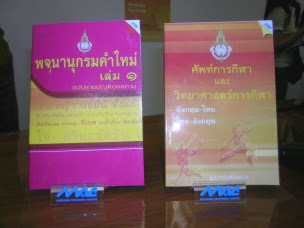[When I said the blog would be sparse, I didn't mean the content. Or so I thought. Sorry about the dearth of posts lately. I've just gotten back to Bangkok and started work again in earnest. Life is busy. In the meantime, here is something I'm cross-posting from
Language Scraps.]
I'm an amateur translator. Mostly Thai to English, though I've dabbled with English to Thai. Much more difficult. There are some short examples of my work (in English) on my personal blog here here and here. They're excerpts from books I've read, and there's another post about translating titles here.
How do you convey something in another language? There's an Italian saying, "traduttore, traditore." That is, "translator, traitor." I first heard this phrase in an essay by Umberto Eco, which decries, in part, the sentiment behind it, by encouraging the original author to be involved in the translation of his work. I particularly like this statement of Eco's:
The job of translation is a trial and error process, very similar to what happens in an Oriental bazaar when you are buying a carpet. The merchant asks 100, you offer 10 and after an hour of bargaining you agree on 50.
I think this is a great insight into the nature of translation. There is no Perfect Language, so there is no Perfect Translation. Eco's explanation of source-oriented vs. target-oriented translation was quite helpful for me.
This essay on the problem of translating puns gives the following dilemma, thought up by French philosopher Jacques Derrida. Translate the following phrase into English:
"Oui, oui, vous m'entendez bien, ce sont des mots français."
You might translate it as, "Yes, yes, you are receiving me well, these are French words." But wait, they're not anymore. In that case, is "Yes, yes, you are receiving me well, these are not French words" a better translation? What about "English words"? You will probably offend some portion of readers with any of these solutions. Eco mentions a similar problem in translating the French dialogue portions of War and Peace into French--there was a specific reason Tolstoy chose to include French dialogue, or why Eco chose to include Latin text in The Name of the Rose, and why the Latin was left untranslated in the English version of that novel.
Eco ends the essay with a lighthearted reference to the Italian maxim by calling translation "admirable treason." I just hope my efforts, leave much to be desired though they may, can too be called admirable. Or am I weaving the noose for my own traitorous neck?


